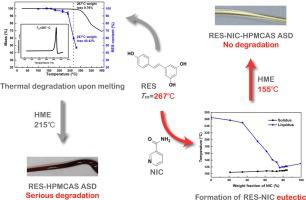International Journal of Pharmaceutics ( IF 5.3 ) Pub Date : 2021-08-25 , DOI: 10.1016/j.ijpharm.2021.121042 Huanyue Zhou 1 , Yu Wang 1 , Shuting Li 1 , Ming Lu 1

|
Hot melt extrusion (HME) is a technique applied in the preparation of pharmaceutical amorphous solid dispersions (ASD). Notably it is important to prevent thermal degradation of heat-sensitive drugs during HME. In this study, we present a new strategy to improve chemical stability of pharmaceutical compounds during HME through the formation of eutectics with small molecules. Resveratrol (RES) was selected as the model compound because it is a heat-liable natural product with a very high melting point of 267 °C. When heated at its melting point for 3 min, it degrades by 40%. RES can co-crystallize with nicotinamide (NIC) in solution, however, it can only form a eutectic with NIC during heating. HPMCAS was selected as the polymer matrix and the drug loading of RES was fixed as 20% (weight ratio). The lowest extrusion temperature that can result to RES-HPMCAS ASD is 215 °C. At this temperature, RES shows 7.36% degradation during extrusion. Replacement of 21.4% HPMCAS with NIC decreased the melting temperature of NIC and thus lowered the minimal extrusion temperature to 155 °C. This effectively prevented thermal degradation of RES without negatively affecting non-sink dissolution. The only extra cost for this method is stricter storage conditions (low temperature and low humidity) due to the low glass transition temperature of NIC. Similar strategy may be applied to other heat-liable drugs in similar ways. This study demonstrates the use of eutectic formation for preventing thermal degradation of drug during extrusion of ASD.
中文翻译:

基于与烟酰胺形成共晶提高白藜芦醇在热熔挤出中的化学稳定性
热熔挤出 (HME) 是一种应用于制备药物无定形固体分散体 (ASD) 的技术。值得注意的是,在 HME 期间防止热敏药物的热降解非常重要。在这项研究中,我们提出了一种新策略,通过与小分子形成共晶来提高 HME 期间药物化合物的化学稳定性。选择白藜芦醇 (RES) 作为模型化合物是因为它是一种耐热的天然产物,熔点高达 267 °C。当在其熔点下加热 3 分钟时,它会降解 40%。RES 可以与溶液中的烟酰胺 (NIC) 共结晶,但是,它只能在加热过程中与 NIC 形成共晶。选择 HPMCAS 作为聚合物基质,RES 的载药量固定为 20%(重量比)。可导致 RES-HPMCAS ASD 的最低挤出温度为 215 °C。在此温度下,RES 在挤出过程中表现出 7.36% 的降解。用 NIC 代替 21.4% HPMCAS 降低了 NIC 的熔化温度,从而将最小挤出温度降低到 155 °C。这有效地防止了 RES 的热降解,而不会对非汇溶解产生负面影响。由于 NIC 的玻璃化转变温度较低,此方法唯一的额外成本是更严格的存储条件(低温和低湿度)。类似的策略可以以类似的方式应用于其他耐热药物。该研究证明了使用共晶形成来防止 ASD 挤出过程中药物的热降解。含 NIC 的 4% HPMCAS 降低了 NIC 的熔化温度,从而将最小挤出温度降低到 155 °C。这有效地防止了 RES 的热降解,而不会对非汇溶解产生负面影响。由于 NIC 的玻璃化转变温度较低,此方法唯一的额外成本是更严格的存储条件(低温和低湿度)。类似的策略可以以类似的方式应用于其他耐热药物。该研究证明了使用共晶形成来防止 ASD 挤出过程中药物的热降解。含 NIC 的 4% HPMCAS 降低了 NIC 的熔化温度,从而将最小挤出温度降低到 155 °C。这有效地防止了 RES 的热降解,而不会对非汇溶解产生负面影响。由于 NIC 的玻璃化转变温度较低,此方法唯一的额外成本是更严格的存储条件(低温和低湿度)。类似的策略可以以类似的方式应用于其他耐热药物。该研究证明了使用共晶形成来防止 ASD 挤出过程中药物的热降解。由于 NIC 的玻璃化转变温度较低,此方法唯一的额外成本是更严格的存储条件(低温和低湿度)。类似的策略可以以类似的方式应用于其他耐热药物。该研究证明了使用共晶形成来防止 ASD 挤出过程中药物的热降解。由于 NIC 的玻璃化转变温度较低,此方法唯一的额外成本是更严格的存储条件(低温和低湿度)。类似的策略可以以类似的方式应用于其他耐热药物。该研究证明了使用共晶形成来防止 ASD 挤出过程中药物的热降解。











































 京公网安备 11010802027423号
京公网安备 11010802027423号